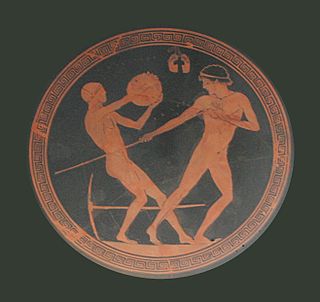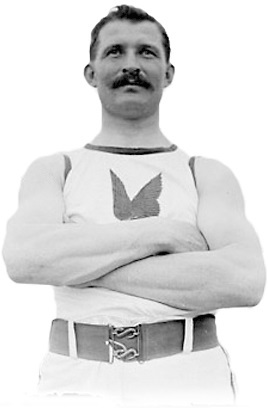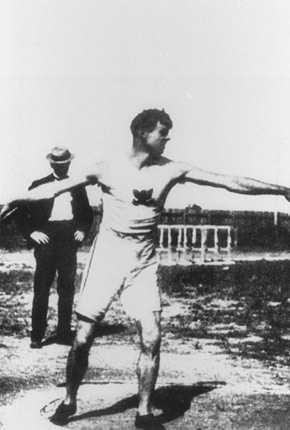
Track and field is a sport that includes athletic contests based on running, jumping, and throwing skills. The name is derived from where the sport takes place, a running track and a grass field for the throwing and some of the jumping events. Track and field is categorized under the umbrella sport of athletics, which also includes road running, cross country running and racewalking.

A pentathlon is a contest featuring five events. The name is derived from Greek: combining the words pente (five) and -athlon (competition). The first pentathlon was documented in Ancient Greece and was part of the Ancient Olympic Games. Five events were contested over one day for the Ancient Olympic pentathlon, starting with the long jump, javelin throwing, and discus throwing, followed by the stadion and wrestling. Pentathletes were considered to be among the most skilled athletes, and their training was often part of military service—each of the five events in the pentathlon was thought to be useful in war or battle.

Joseph-Étienne Desmarteau was a Canadian athlete, winner of the weight throwing event at the 1904 Summer Olympics.

Canada competed at the 1904 Summer Olympics in St. Louis, United States. These Games were the second at which Canadian athletes participated. As in 1900 they did not compete under the Canadian flag, national teams not being introduced until the next Olympics. Unofficially, however, it was a very successful Olympics for Canada with Canadian competitors winning the fourth most medals. However, this was largely because most Europeans decided not to make the long trip to compete in the games. The Canadian athletes were a unified group for the first time and were unofficially regarded as a team.

The men's discus throw was one of four men's throwing events on the Athletics at the 1964 Summer Olympics program in Tokyo. It was held on 15 October 1964. 29 athletes from 21 nations entered, with 1 additional athlete not starting in the qualification round. The maximum number of athletes per nation had been set at 3 since the 1930 Olympic Congress. The event was won by Al Oerter of the United States, the nation's fourth consecutive and 11th overall victory in the men's discus throw. Oerter became the first man to win three medals in the event, all of them gold. He was only the second person to win three consecutive gold medals in any individual athletics event. It was the third of his four consecutive wins in the event. Ludvik Danek of Czechoslovakia took silver to break up the Americans' two-Games dominance of the discus podium; no non-American had won a medal since 1952. Dave Weill earned bronze to make this the fourth straight Games that the United States had won at least two medals in the event.

John Joseph Flanagan was an Irish-American three-time Olympic gold medalist in the hammer throw, winning in 1900, 1904, and 1908.

The men's discus throw was one of six throwing events on the Athletics at the 1908 Summer Olympics programme in London. The competition was held on July 16, 1908. 42 throwers from eleven nations competed. NOCs could enter up to 12 athletes. The event was won by Martin Sheridan of the United States, his second consecutive victory in the event. The Americans completed their first sweep in the discus throw, with Merritt Giffin taking silver and Bill Horr bronze.

The men's hammer throw was one of six throwing events on the Athletics at the 1908 Summer Olympics programme in London. The competition was held on July 14, 1908. 19 throwers from eight nations competed. NOCs could enter up to 12 athletes. The event was won by American John Flanagan, his third consecutive victory in the event. He was the first man to win three medals in the hammer throw and, as of the 2016 Games, the only one to win three gold medals in the event. The silver medal went to fellow American Matt McGrath. Con Walsh of Canada took bronze and became the first athlete not from the United States to win a medal in the event, as the Americans had swept the podium in both 1900 and 1904. The three medalists were all part of the Irish Whales.

The men's shot put was one of six throwing events on the Athletics at the 1908 Summer Olympics programme in London. The competition was held on July 16, 1908. 25 shot putters from eight nations competed. NOCs could enter up to 12 athletes. The event was won by Ralph Rose, successfully defending his title from 1904 and making it four consecutive Games that the event was won by an American. The two-Games streak of sweeps in 1900 and 1904 ended, however, as Denis Horgan of Great Britain took silver. Johnny Garrels of the United States took bronze. Rose was the second man to win two medals in the shot put ; Wesley Coe nearly was the third as he ended up in 4th place, only 11 centimetres behind Garrels.

Wesley William Coe Jr., sometimes listed as William Wesley Coe Jr., was an American track and field athlete who competed principally in the shot put and also in the hammer throw, discus throw, and tug of war.

The men's discus throw was a track and field athletics event held as part of the Athletics at the 1904 Summer Olympics programme. It was the third time the event was held. The competition was held on Saturday, September 3, 1904. Six athletes from two nations competed.

The men's hammer throw was a track and field athletics event held as part of the Athletics at the 1904 Summer Olympics programme. It was the second time the event was held. The competition was held on Monday, August 29, 1904. Six athletes, all from the United States, competed. John Flanagan, the reigning champion, defended his gold medal and set a new Olympic record. John DeWitt took silver and Ralph Rose bronze. It was the second consecutive medal sweep for the United States in the event. Flanagan was the first man to earn multiple medals in the event; he would finish with three consecutive victories, a record not matched by anyone in the hammer throw.

The men's shot put was a track and field athletics event held as part of the athletics at the 1912 Summer Olympics programme. The competition was held on Wednesday, July 10, 1912. Twenty-two shot putters from 14 nations competed. NOCs could enter up to 12 athletes. The event was won by Pat McDonald of the United States, the nation's fifth consecutive victory in the men's shot put. The American team swept the top three places, the third time in five Games. Ralph Rose took silver, 9 centimetres shy of a third gold medal; he became the first man to win three medals of any color.

The men's hammer throw was a track and field athletics event held as part of the athletics at the 1912 Summer Olympics programme. It was the fourth appearance of the event, which had been won all three previous times by John Flanagan. The competition was held on Sunday, July 14, 1912. Fourteen hammer throwers from four nations competed. NOCs could enter up to 12 athletes. The event was won by Matt McGrath of the United States, the nation's fourth consecutive victory in the event. McGrath was the second man to earn multiple medals in the hammer throw. Duncan Gillis of Canada took silver. Clarence Childs of the United States finished third for bronze.
The men's 56 pound weight throw event was part of the track and field athletics programme at the 1920 Summer Olympics. It was the second appearance of this event after the debut in 1904. The Intercalated Games in 1906 saw a stone throw event. The competition was held on Friday, August 20, 1920, and on Saturday, August 21, 1920.

The men's hammer throw event was part of the track and field athletics programme at the 1924 Summer Olympics. The competition was held on Thursday, July 10, 1924. 15 hammer throwers from ten nations competed. The maximum number of athletes per nation was 4. The event was won by Fred Tootell of the United States, the nation's sixth consecutive victory in the event. Tootell was the first of the winners to have been born in the United States; the previous winners had all been Irish-American. Fellow American Matt McGrath, the 1908 silver medalist and 1912 champion, took silver once again; he was the second man to earn three medals in the hammer throw. Malcolm Nokes earned Great Britain's first medal in the event with his bronze.

The men's hammer throw event was part of the track and field athletics programme at the 1936 Summer Olympics. The competition was held on August 3, 1936. There were 27 competitors from 16 nations. The maximum number of athletes per nation had been set at 3 since the 1930 Olympic Congress. The final was won by Karl Hein of Germany. The silver medal went to Erwin Blask, also of Germany. They were the first medals for Germany in the event; Germany was also the first country other than the United States to have two medalists in the event in the same Games. Fred Warngård of Sweden took bronze. The United States' eight-Games medal streak in the hammer throw was snapped, with the Americans' best result being William Rowe's fifth place.

The men's shot put event was part of the track and field athletics programme at the 1948 Summer Olympics. Twenty-four athletes from 15 nations competed. The maximum number of athletes per nation had been set at 3 since the 1930 Olympic Congress. The competition was held on 3 August. The final was won by American Wilbur Thompson. Thompson's compatriots, Jim Delaney and Jim Fuchs took 2nd and 3rd place. It was the ninth time that an American had won the event, and the fifth time that the Americans had swept the medals.
The weight throw at the Summer Olympics was contested at the multi-sport event in 1904 and 1920. Part of the Olympic athletics programme, it was the fourth track and field throwing event to be contested at the Olympics, after the shot put, discus throw and hammer throw. The latter three events, along with the javelin throw, are now the only four throwing events on the Olympic programme. Only men competed in the two years that the event was held.
















